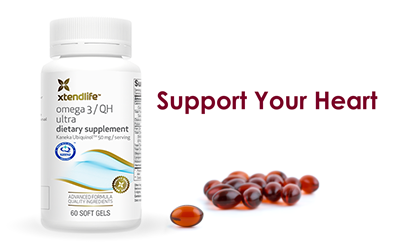|
CoEnzymeQ10 (CoQ10) is known as an essential nutrient that helps support the immune system’s response to oxidative stress. It also helps the body produce the majority (up to 95 percent) of its energy by converting the energy we take in through carbohydratess and fats into adenosine triphosphate (ATP), the molecule that serves as the bank for all our body’s energy stores.
“Despite the aging process, every cell in the body is in the business of producing energy to keep you vital and healthy. The energy each cell produces is in the form of a molecule called ATP, which is made in the energy powerhouse of the cell known as the mitochondria. Ubiquinol may help support the healthy energy production and processes within the body,” according to Dr. Mehmet Oz. (Ref. 1)
The heart requires a large amount of energy to expand and contract, and while the body is able to produce CoQ10 – so it can turn carbohydrates and fats into energy for our hearts to use - our ability to produce the enzyme goes down as we age, so after 40, we tend to have less of the nutrient on hand than we need.
Ubiquinol vs. ubiquinone: A tutorial
CoQ10 exists in the body in two forms – ubiquinone or ubiquinol. As we age, it’s not only harder to replenish the levels of CoQ10 we need, but also harder to convert existing ubiquinone to the more potent form, ubiquinol, so our bodies can use it better. (Ref. 2)
That’s not good news when it comes to heart disease, because the heart – as our most powerful muscle requiring the most energy - is particularly vulnerable to those low levels of ubiquninol.
Studies have shown that people with heart conditions tend to have a significantly lower concentration of CoQ10 in their heart tissue than those without heart issues.
“I’ve often said I wouldn't practice cardiology without coenzyme Q10,” said Dr. Stephen Sinatra, who formerly served as the chief of cardiology at Manchester Memorial Hospital and founded the New England Heart & Longevity Center. “If there is just one thing you do to help maintain your heart’s health, make sure you’re taking CoQ10 daily.”
A 2008 study in the journal Biofactors, from longtime ubiquinol researcher’s doctors Peter H. and Alena M. Langsjoen found that supplementing with ubiquinol helped support and maintain healthy cardiovascular function.
In 2010, German researchers found that ubiquinol was also beneficial at helping maintain healthy cholesterol levels in a study that appeared in the Journal Molecular Nutrition and Food Research. (Ref. 3)

What about statins
Statins – the top-selling medications in the world – can be particularly damaging to ubiquinol levels.
Prescribed to help lower cholesterol, the drugs also have a tendency to lower CoQ10 levels, creating a serious catch-22 given that both high cholesterol and low CoQ10 are linked to heart disease.
According to a study appearing in the Journal of the American Medical Association, those who took the statin simvastatin showed a 22 percent decrease in ubiquinol levels in both the body and the heart muscle.
The study concluded that long-term use of statin medications can lead to nerve damage and breakdown of muscle tissue, which can lead to debilitating muscle pain. (Ref. 4)
We include genuine Kaneka QH ubiquinol in our Omega 3/QH Ultra. This is produced in Japan by Kaneka. Not only is Kaneka a world leader in ubiquinol research, but Kaneka is the first company to make ubiquinol available as a supplement.
References:
- http://www.doctoroz.com/article/ubiquinol-ally-against-aging?page=1
- http://www.bodybuilding.com/fun/coq10-ubiquinone-ubiquinol-whats-the-difference.htm
- http://www.ncbi.nlm.nih.gov/pubmed/19096107
- http://www.ncbi.nlm.nih.gov/pubmed/19960455
|

